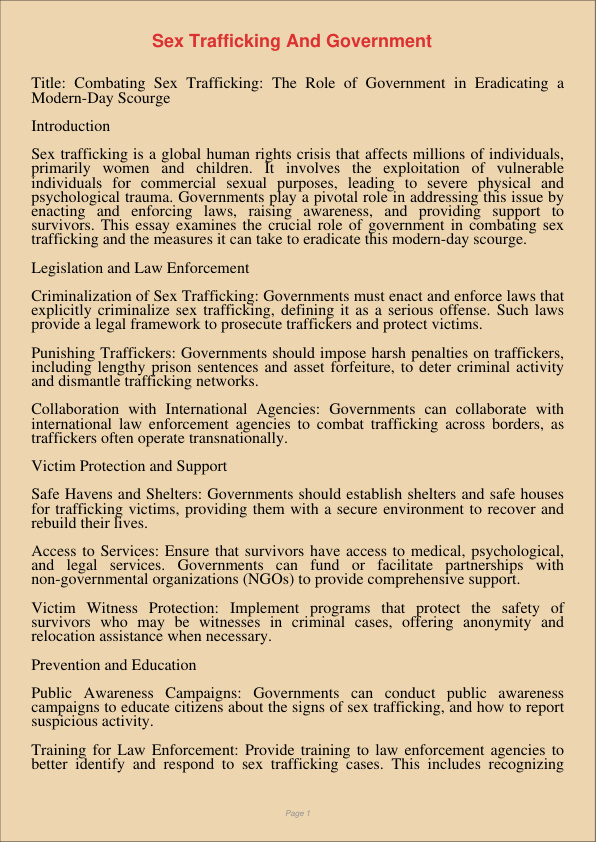Sex Trafficking And Government
Jan 12, 2024
sex trafficking
government
Sociology
Biology
Title: Combating Sex Trafficking: The Role of Government in Eradicating a Modern-Day Scourge
Introduction
Sex trafficking is a global human rights crisis that affects millions of individuals, primarily women and children. It involves the exploitation of vulnerable individuals for commercial sexual purposes, leading to severe physical and psychological trauma. Governments play a pivotal role in addressing this issue by enacting and enforcing laws, raising awareness, and providing support to survivors. This essay examines the crucial role of government in combating sex trafficking and the measures it can take to eradicate this modern-day scourge.
Legislation and Law Enforcement
Criminalization of Sex Trafficking: Governments must enact and enforce laws that explicitly criminalize sex trafficking, defining it as a serious offense. Such laws provide a legal framework to prosecute traffickers and protect victims.
Punishing Traffickers: Governments should impose harsh penalties on traffickers, including lengthy prison sentences and asset forfeiture, to deter criminal activity and dismantle trafficking networks.
Collaboration with International Agencies: Governments can collaborate with international law enforcement agencies to combat trafficking across borders, as traffickers often operate transnationally.
Victim Protection and Support
Safe Havens and Shelters: Governments should establish shelters and safe houses for trafficking victims, providing them with a secure environment to recover and rebuild their lives.
Access to Services: Ensure that survivors have access to medical, psychological, and legal services. Governments can fund or facilitate partnerships with non-governmental organizations (NGOs) to provide comprehensive support.
Victim Witness Protection: Implement programs that protect the safety of survivors who may be witnesses in criminal cases, offering anonymity and relocation assistance when necessary.
Prevention and Education
Public Awareness Campaigns: Governments can conduct public awareness campaigns to educate citizens about the signs of sex trafficking, and how to report suspicious activity.
Training for Law Enforcement: Provide training to law enforcement agencies to better identify and respond to sex trafficking cases. This includes recognizing victims, handling cases sensitively, and coordinating with support services.
Incorporate Anti-Trafficking Education in Schools: Integrate anti-trafficking education into the curriculum, educating children and adolescents about the dangers of trafficking and the importance of respectful relationships.
International Cooperation
Ratification of International Agreements: Governments can ratify and enforce international agreements and protocols, such as the United Nations Protocol to Prevent, Suppress and Punish Trafficking in Persons.
Bilateral and Multilateral Agreements: Forge partnerships with other nations to coordinate efforts, share intelligence, and extradite traffickers operating internationally.
Data Collection and Research
Collect Comprehensive Data: Governments should gather comprehensive data on the extent of sex trafficking within their borders. This data can inform policies and interventions.
Support Research: Fund research on sex trafficking to better understand its root causes, trends, and the impact of policies and interventions. Evidence-based strategies are more effective in combatting the issue.
Conclusion
The eradication of sex trafficking is a complex and multifaceted challenge, but governments play a crucial role in this endeavor. By enacting and enforcing laws, protecting victims, raising awareness, and collaborating with international partners, governments can contribute significantly to the fight against this modern-day scourge. It is imperative that societies and governments worldwide continue to prioritize efforts to combat sex trafficking and provide a future free from exploitation for all individuals.
